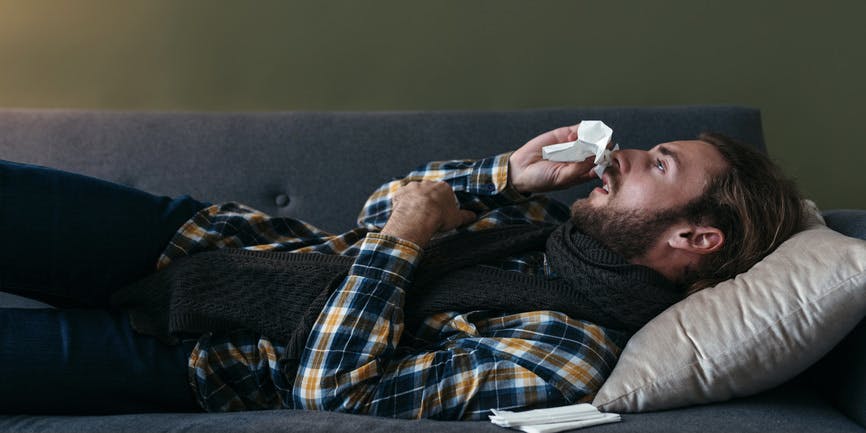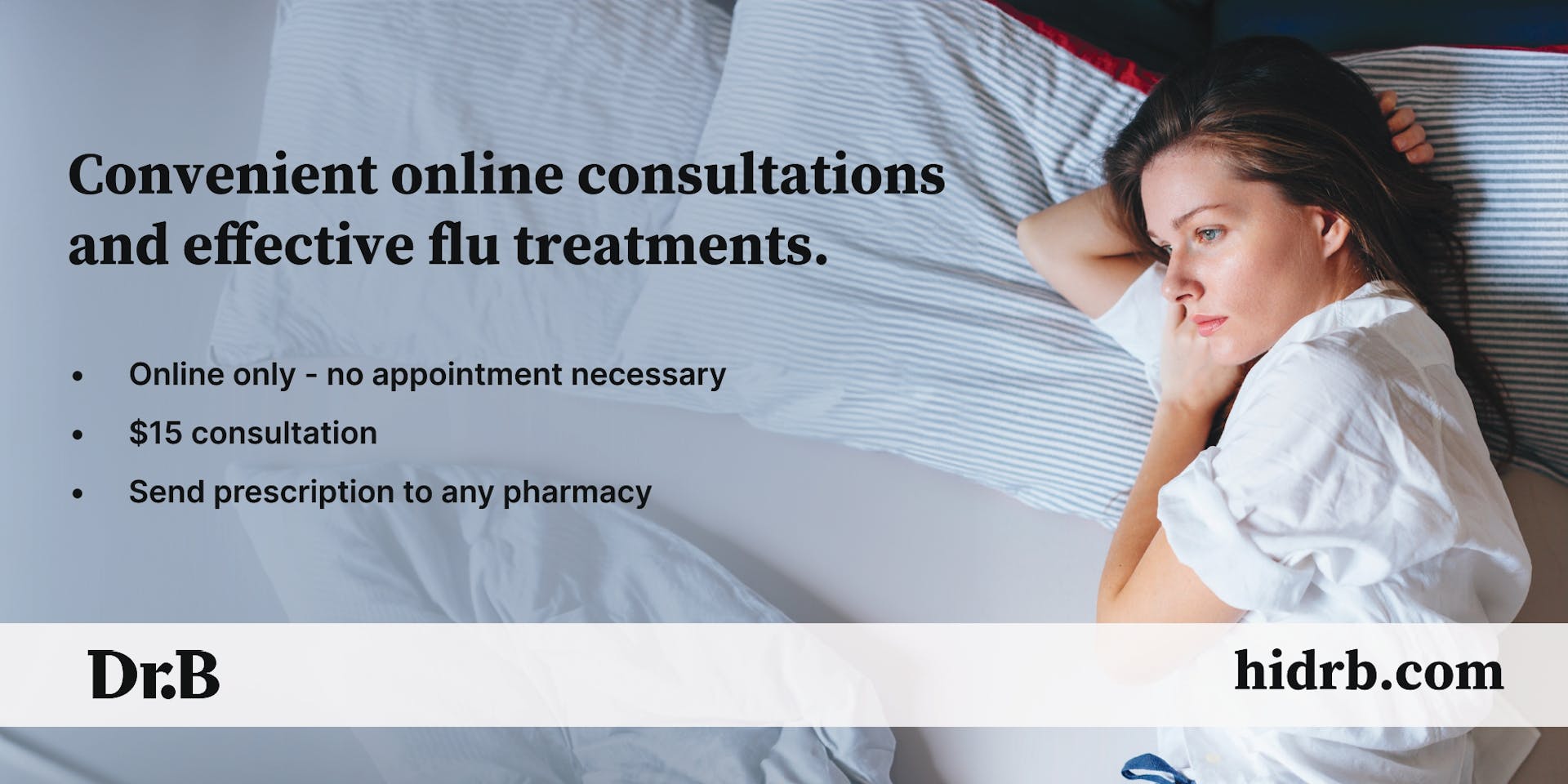
What to do before (and avoid after) a flu shot

Topics
Key points:
- The flu vaccine can reduce the chance you’ll contract the flu virus—or reduce the severity of your infection if you get ill.
- Most people feel fine after getting their shot, and you’ll likely be able to continue your daily routine.
- Some people experience mild soreness in their arm or feel tired for a day or two. Rest and medicines like Acetaminophen are usually enough to help manage side effects.
We get it—no one likes getting shots. But the flu vaccine is the best way to protect yourself and your loved ones from this seasonal virus. Millions of people get their flu vaccine every year, and decades of research show that it’s safe, effective and generally causes few side effects.
Still, it’s a good idea to know what to expect after getting your annual shot—from what to avoid after your flu vaccine to the best self-care tips. Below, our Dr. B team shares all the answers.
And if you do get sick, we can help with that, too. Read on to learn how our $15 online flu consultations can help you determine whether an antiviral medication could help you recover faster.
How effective is the flu vaccine at preventing illness?
The flu vaccine provides excellent protection against the virus, reducing the risk of illness by 40-60%. Across the 2022-2023 flu season (the last for which statistics are complete), the CDC estimates that vaccination prevented 6 million flu cases, 65,000 flu hospitalizations and almost 4,000 flu deaths in the United States alone!
Of those who get infected, vaccinated people usually experience milder symptoms and get better faster than unvaccinated people.
For the 2024-2025 flu season, all types of flu vaccine options are trivalent vaccines. That means they protect against three strains of the four types of flu viruses.
This season, they protect against an A(H1N1) virus, an A(H3N2) virus and a B/Victoria virus.
How bad are flu shot side effects?
Most people feel completely fine after getting their flu vaccine. Some people feel tired for a few days or develop pain or soreness in the arm where they got the injection. A few will develop a fever. In the majority of cases, these symptoms are mild and go away in a day or two.
The most common side effects of the flu vaccine are:
- Pain or soreness at the injection site
- Tiredness or fatigue
- Body or muscle aches
- Fever
- Irritability
Very rarely, people have more serious side effects. Allergies to the flu vaccine can happen—but they’re uncommon. If you notice signs of an allergic reaction like itching, trouble breathing or swelling in your mouth or throat, get emergency medical help immediately.
Medications to avoid after a flu shot
Continue your regular medications unless your medical provider tells you otherwise. Very few medications interact with the vaccine—and most that do reduce its efficacy rather than cause an uncomfortable reaction.
If you develop pain or fever after getting your vaccine, you can use over-the-counter medications like Acetaminophen (Tylenol) or non-steroidal anti-inflammatory medicines (NSAIDs) like Ibuprofen, Advil, and Aleve.
As always, speak with your provider if you have specific concerns.
Are there foods I should avoid after a flu shot?
It’s okay to follow your regular diet. The only thing that you should potentially avoid is alcohol. Alcohol can cause side effects similar to the vaccine (like tiredness and headache), making you feel worse.
As always, it’s essential to support your immune system by eating a varied diet with plenty of fruits, vegetables and whole grains. These foods will help your body stay healthy and strong all through flu season.
Can I exercise after getting a flu shot?
Most people don’t need to stop going to work or school or caring for loved ones. But in case you might feel extra tired for a few days, it’s probably a good idea to avoid getting your shot the day before running a marathon or taking your SATs.
That said, you can exercise after getting your flu shot—and some research shows that exercising after the vaccine may provoke a better immune response. But if you’re too tired to exercise after getting your shot, taking it easy until you feel back to normal is okay.
Best self-care practices after getting a flu shot
While you can continue your routine after getting a flu shot, you might want to plan for an early bedtime or to Netflix and chill the day after. Best case scenario? You feel fine and get to enjoy some extra time with your remote.
Not feeling so hot after the vaccine?
Here’s how to take care of yourself:
- Continue with normal activities as long as you feel up to it.
- Listen to your body—take it easy if you’re tired or run a fever.
- Drink plenty of fluids and eat a healthy diet.
- Wash your hands and continue practicing good hygiene to avoid getting sick.
- Take over-the-counter pain relief if you’re in a lot of discomfort.
- Avoid alcohol, which can make side effects feel worse.
Can I get the flu after getting my flu shot?
It takes two weeks for the vaccine to reach maximum effectiveness. That’s because it takes time for the vaccine to teach your body how to respond to potential invaders. If you are exposed to the virus just before you get your shot—or in the two weeks after—you could still get sick. This doesn’t mean that the vaccine didn’t work. It’s just bad timing.
If you do catch the flu, take care of yourself. Rest, drink plenty of fluids and stay away from others to avoid spreading the virus. Prescription antiviral medications can help you get better faster if taken within two days of your first symptoms.
If you need same-day treatment, Dr. B has you covered! Just start a $15 online flu consultation. A licensed provider will review your information and, if appropriate, send a prescription to the pharmacy of your choice.
Sources
American Medical Association. (2024). 8 things doctors wish patients knew about flu vaccines.
Centers for Disease Control and Prevention. (2024). Benefits of the flu vaccine.
Centers for Disease Control and Prevention. (2023). Flu vaccine safety.
Centers for Disease Control and Prevention. (2024). Key facts about seasonal flu vaccine.
Kalarikkal, S.M., et al. (2023). Influenza vaccine. StatPearls Publishing.
McLean, H. Q., et al. (2021). Influenza vaccine effectiveness: new insights and challenges. Cold Spring Harbor Perspectives in Medicine.
Reynolds, Gretchen. (2022). Exercise may enhance the effects of a Covid or flu shot. New York Times.
Topics
Sign up for the free Dr. B newsletter for a weekly report on the latest in healthcare + research-based advice for staying healthy and mentally well.


